unit9知识点复习
九年级英语unit9知识点语法
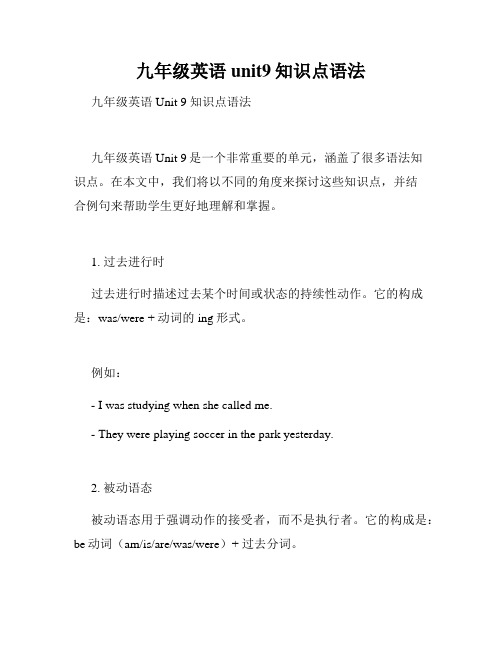
九年级英语unit9知识点语法九年级英语Unit 9 知识点语法九年级英语Unit 9是一个非常重要的单元,涵盖了很多语法知识点。
在本文中,我们将以不同的角度来探讨这些知识点,并结合例句来帮助学生更好地理解和掌握。
1. 过去进行时过去进行时描述过去某个时间或状态的持续性动作。
它的构成是:was/were + 动词的ing形式。
例如:- I was studying when she called me.- They were playing soccer in the park yesterday.2. 被动语态被动语态用于强调动作的接受者,而不是执行者。
它的构成是:be动词(am/is/are/was/were)+ 过去分词。
例如:- The book was written by J.K. Rowling.- The cake was eaten by the children.3. 倒装句倒装句常用于强调句子中的某一部分或者在特殊情况下使用。
主要有以下三种情况:- 定位副词位于句首时,主语和谓语动词颠倒。
- 含有“否定词+never”的句子,当表达完全不可能的情况时,需要把助动词或情态动词提前,即“否定词/never+助动词/情态动词+主语+谓语”。
- 在so/such的引导下的倒装句,主要是用于表示由前一句引起的结果。
例如:- Upstairs sat the old man, reading a book.- Never have I seen such a beautiful sunset.- So loud was the music that I couldn't sleep.4. 特殊疑问句特殊疑问句用于询问特定的信息。
在一般疑问句的基础上,改变谓语动词的位置,并使用特殊疑问词。
例如:- What did you do last weekend?- Where is your brother going on vacation?- How long have you been studying English?5. 非限制性定语从句非限制性定语从句用于对先行词进行补充说明,一般用逗号隔开。
unit9haveyoueverbeentoamuseum知识点梳理及单元复习
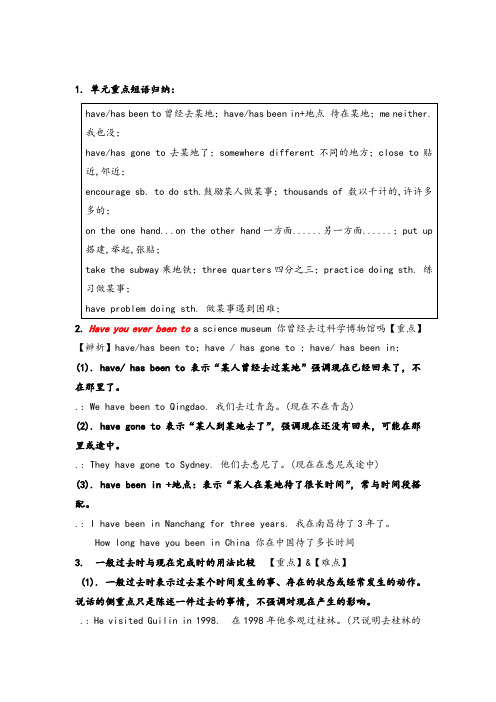
1. 单元重点短语归纳:2. Have you ever been to a science museum 你曾经去过科学博物馆吗【重点】【辨析】have/has been to;have / has gone to ;have/ has been in;(1). have/ has been to 表示“某人曾经去过某地”强调现在已经回来了,不在那里了。
.: We have been to Qingdao. 我们去过青岛。
(现在不在青岛)(2). have gone to表示“某人到某地去了”,强调现在还没有回来,可能在那里或途中。
.: They have gone to Sydney. 他们去悉尼了。
(现在在悉尼或途中)(3). have been in +地点:表示“某人在某地待了很长时间”,常与时间段搭配。
.: I have been in Nanchang for three years. 我在南昌待了3年了。
How long have you been in China 你在中国待了多长时间3. 一般过去时与现在完成时的用法比较【重点】&【难点】(1). 一般过去时表示过去某个时间发生的事、存在的状态或经常发生的动作。
说话的侧重点只是陈述一件过去的事情,不强调对现在产生的影响。
.: He visited Guilin in 1998. 在1998年他参观过桂林。
(只说明去桂林的时间)(2). 现在完成时表示动作发生在过去,对现在造成了影响或产生了结果。
不能与确定的过去时间状语连用。
.: Jill has bought a new computer. 吉尔买了一台新电脑。
I have taught here for fifteen years. 我在这儿教学已经15年了。
I have seen the film. 我看过这部电影。
(我了解这部电影的内容)I saw the film last week. 我上周看了这部电影。
Unit9_Have_you_ever_been_to_a_museum知识点梳理及单元复习

Unit 9知识点梳理和单元复习附参考答案1. 单元重点短语归纳:have/has been to曾经去某地;have/has been in+地点待在某地;me neither.我也没;have/has gone to去某地了;somewhere different不同的地方;close to贴近,邻近;encourage sb. to do sth.鼓励某人做某事;thousands of 数以千计的,许许多多的;on the one hand...on the other hand一方面......另一方面......;put up搭建,举起,张贴;take the subway乘地铁;three quarters四分之三;practice doing sth. 练习做某事;have problem doing sth. 做某事遇到困难;2. Have you ever been to a science museum? 你曾经去过科学博物馆吗?【重点】【辨析】have/has been to;have / has gone to ;have/ has been in;(1). have/ has been to 表示“某人曾经去过某地”强调现在已经回来了,不在那里了。
E.g.: We have been to Qingdao. 我们去过青岛。
(现在不在青岛)(2). have gone to表示“某人到某地去了”,强调现在还没有回来,可能在那里或途中。
E.g.: They have gone to Sydney. 他们去悉尼了。
(现在在悉尼或途中)(3). have been in +地点:表示“某人在某地待了很长时间”,常与时间段搭配。
E.g.: I have been in Nanchang for three years. 我在南昌待了3年了。
How long have you been in China? 你在中国待了多长时间?3. 一般过去时与现在完成时的用法比较【重点】&【难点】(1). 一般过去时表示过去某个时间发生的事、存在的状态或经常发生的动作。
Unit9 知识要点
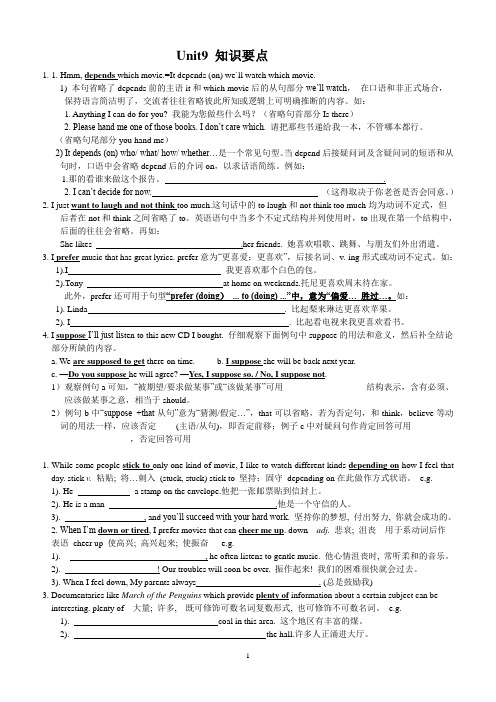
Unit9 知识要点1.1. Hmm, depends which movie.=It depends (on) we`ll watch which movie.1) 本句省略了depends前的主语it和which movie后的从句部分we’ll watch,在口语和非正式场合,保持语言简洁明了,交流者往往省略彼此所知或逻辑上可明确推断的内容。
如:1. Anything I can do for you? 我能为您做些什么吗?(省略句首部分Is there)2. Please hand me one of those books. I don’t care which. 请把那些书递给我一本,不管哪本都行。
(省略句尾部分you hand me)2) It depends (on) who/ what/ how/ whether…是一个常见句型。
当depend后接疑问词及含疑问词的短语和从句时,口语中会省略depend后的介词on,以求话语简练。
例如:1.那的看谁来做这个报告。
.2. I can’t decide for now.(这得取决于你老爸是否会同意。
)2. I just want to laugh and not think too much.这句话中的to laugh和not think too much均为动词不定式,但后者在not和think之间省略了to。
英语语句中当多个不定式结构并列使用时,to出现在第一个结构中,后面的往往会省略。
再如:She likes .her friends. 她喜欢唱歌、跳舞、与朋友们外出消遣。
3. I prefer music that has great lyrics. prefer意为“更喜爱;更喜欢”,后接名词、v.-ing形式或动词不定式。
如:1).I 我更喜欢那个白色的包。
2).Tony at home on weekends.托尼更喜欢周末待在家。
人教版九年级英语Unit 9知识点总结

九年级英语Unit 9 I like music that I can dance to 讲义一、词性转换Section A1. Australian → (n.) Australia2. director → (v.) direct3. smooth → (v.) smoothen4. ending → (n.) end5. documentary → (n.)document6. intelligent – (n.) intelligenceSection B7. sadness → (adj.) sad8. pain → (adj.) painful9. moving → (v.) move10. perform → (n.) performance11. popular → (n.) popularity二、短语归纳1. sing along with 跟着一起唱2. dance to 随着跳3. different kinds of 不同类型的4. a long week at … 一周长时间的……5. spare time 空闲时间6. in that case 既然那样7. stick to 坚持,固守8. depend on 取决于9. be down 失落10. cheer sb. up 使某人振作起来11. a happy ending 美满的结局12. try one’s best 尽最大努力13. solve one’s problems 解决某人的问题14. a goo way to do sth 一种……好方法15. plenty of 大量,充足16. a certain subject 某个主题17. action movie 动作片18. scary movie 恐怖电影19. shut off 关闭,停止运转20. save the world 拯救世界21. just in time 及时22. once in a while 偶尔地,间或23. do sth alone 独自做某事24. bring a friend 带上一个朋友25. be afraid of sth 怕……26. feel scary 感到害怕/恐怖27. each kind of 每种28. write one’s own lyrics 自己写词29. musical instruments 乐器30. a piece of music 一首乐曲31. folk music 民俗音乐32. cry along with 随着哭33. look up 查阅,抬头看34. teach sb. to do sth. 教某人做某事35. grow worse 变得更糟36. develop a serious illness 得了很严重的病37. become blind 变成盲人38. live on the street 住在街上39. play on the street 在街上表演40. in this way 以这种方式41. musical skills 音乐技能42. during one’s lifetime 在某人的一生中43. in total 总共,总计44. for this reason 由于这个原因45. painful experiences 痛苦的经历46. touch the heart(s) of sb. 打动人心47. pain and wounds 痛苦和创伤48. praise sb. as称赞某人为1. I suppose… 我想……2. feel like doing 想做某事3. too + adj. + to do 太……而不……4. not do sth anymore 不在做某事5. It is a pity that… 遗憾的是……6. …is a time for… ……是一个……的时间三.重点句子1. I prefer music that has great lyrics.我更喜欢有好歌词的音乐。
九年级英语Unit9 知识点
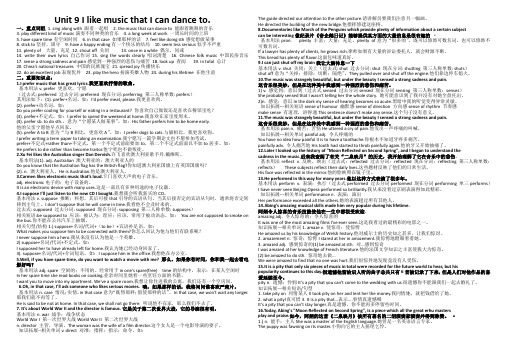
Unit 9 I like music that I can dance to.一、重点词组1. sing along with 跟着一起唱 2. the music that can dance to 能跟着跳舞的音乐3. play different kind of music演奏不同种类的音乐4. a long week at work 一周长时间的上班5. have spare time有空闲时间6. in that case 如果那样的话7. feel like doing sth感觉想做某事8. stick to坚持,固守9. have a happy ending有一个快乐的结局10. seem less serious似乎不严重11. plenty of 大量,充足12. shout off 关闭13. once in a while 偶尔,间或14. write their own lyrics 自己作词15. sing the words clearly 唱词清楚16. Chinese folk music 中国民俗音乐17. sense a strong sadness and pain感觉到一种强烈的悲伤与痛苦18. look up 查阅19. in total 总计20. China’s national treasures 中国的民族瑰宝21. spread joy传播快乐22. do an excellent job表现优异23. play the hero扮演英雄人物24. during his lifetime 在他生前二。
重要知识点:1.I prefer music that has great lyrics.我更喜欢抒情的歌曲。
基本用法v. prefer 更喜欢,宁愿(过去式: preferred 过去分词: preferred 现在分词: preferring 第三人称单数: prefers)其用法如下:(1). prefer+名词。
人教版九年级全一册英语Unit9单元语法知识点总结

人教版九年级全一册英语Unit9单元语法知识点总结本单元重点短语的具体用法1. dance to (music):随着(音乐)跳舞- The children danced to the music at the party.(孩子们在派对上随着音乐跳舞。
)2. sing along with:随着...一起唱- I like to sing along with the radio.(我喜欢随着收音机一起唱歌。
)3. musicians who play different kinds of music:弹奏不同类型音乐的音乐家- The band has musicians who play different kinds of music, including pop and jazz.(这个乐队有弹奏不同类型音乐的音乐家,包括流行音乐和爵士乐。
)4. electronic music:电子音乐- Electronic music is becoming more and more popular.(电子音乐越来越受欢迎。
)5. not much:没什么(事)- - How are you? - Not much.(- 你好吗?- 没什么事。
)6. suppose sb to do sth.:猜想某人做某事- I suppose him to be a doctor.(我猜他是个医生。
)7. be supposed to do sth:应该做某事- You are supposed to hand in your homework on time.(你应该按时交作业。
)8. suppose sb (to be) + adj.:原以为...- I supposed her to be honest, but I was wrong.(我原以为她是诚实的,但我错了。
)9. have spare time:有空闲时间- I don't have much spare time these days.(我最近没有太多空闲时间。
九年级上册英语unit9重点知识点

九年级上册英语unit9重点知识点九年级上册英语Unit 9重点知识点九年级上册英语Unit 9是学习课文《Can you come to my party?》的重点单元。
在这个单元中,学生需要掌握一些重要的知识点,包括常用表达方式、时态用法、词汇拓展等内容。
在本文中,我们将对这些知识点进行详细的分析和介绍。
一、常用表达方式在Unit 9中,有一些常用的表达方式需要我们掌握和运用。
例如,当你邀请别人参加你的派对时,可以用句型“Do youwant/like/love to come to my party?”。
回答时,可以使用句型“I'd love/like to.”或者“Sorry, I can't.”来表示接受或拒绝邀请。
此外,还有一些其他的表达方式,比如“Are you available on...?”(你...有空吗?)和“Could you please...?”(你可以...吗?)等等。
二、时态用法在Unit 9中,我们需要灵活运用一些时态来描述过去、现在和将来的动作。
例如,当询问别人是否有空来参加你的派对时,可以用现在进行时来表示将来的行动,如“What are you doing onSaturday night?”(你周六晚上有什么安排?)。
当接受他人的邀请时,可以用将来时来表达,如“I will come to your party.”(我会来参加你的派对)。
同时,还需要注意一些常用的过去时态,如一般过去时和过去进行时。
三、词汇拓展在Unit 9中,我们还需要掌握一些与派对相关的词汇,并学会拓展应用。
例如,单词“party”可以和其他单词组合形成其他表达方式,比如“birthday party”(生日派对)、“costume party”(化妆舞会)等等。
此外,还有一些与时间和日期有关的词汇,如“next week”(下周)、“last night”(昨晚)、“tomorrow”(明天)等等。
八年级英语u9知识点
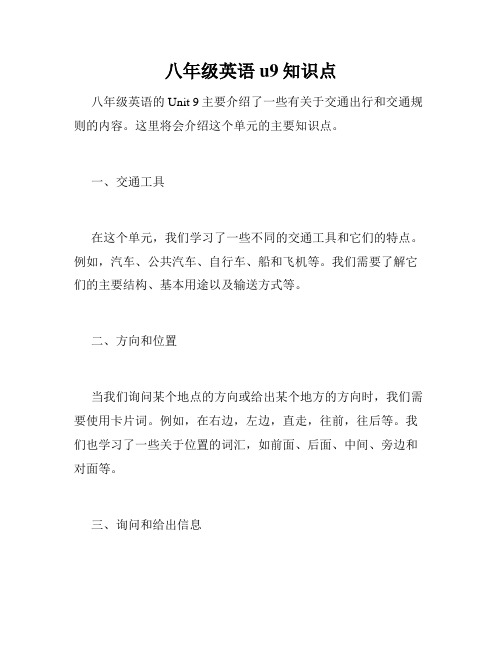
八年级英语u9知识点
八年级英语的Unit 9主要介绍了一些有关于交通出行和交通规则的内容。
这里将会介绍这个单元的主要知识点。
一、交通工具
在这个单元,我们学习了一些不同的交通工具和它们的特点。
例如,汽车、公共汽车、自行车、船和飞机等。
我们需要了解它们的主要结构、基本用途以及输送方式等。
二、方向和位置
当我们询问某个地点的方向或给出某个地方的方向时,我们需要使用卡片词。
例如,在右边,左边,直走,往前,往后等。
我们也学习了一些关于位置的词汇,如前面、后面、中间、旁边和对面等。
三、询问和给出信息
在交通出行中,询问方向、地点和其他相关信息非常重要。
因此,在这个单元,我们学习了一些有关如何有效地进行信息交流
的语言表达方法。
例如,如何向他人提问和回答问题,如何描述
位置,如何提供和请求帮助等。
四、指示词和冠词
在描述交通工具、位置和方向时,我们需要使用指示词和冠词。
这些词语能够帮助我们更清楚地表达意思,如this、that、these、those、a、an和the等。
五、交通规则
学习关于交通规则是出现意外事故和确保人身安全的关键。
在
这个单元里,我们学习了一些常见的交通规则,如穿过马路时如
何确保自己的安全,如何识别交通标记等等。
总结
通过学习这个单元,我们可以更好地了解有关交通出行及其相关信息的表达方法,同时学习了如何提供和请求帮助,如何保障自己的人身安全以及关于交通规则的知识。
这些知识点不仅适用于英语学习,也将对我们的日常生活有所帮助。
八年级英语上册Unit9Canyouetomyparty知识点归纳(新版)

Unit9 Can you e to my party?短语:1.on Saturday afternoon在周六下午2.prepare for为……做准备prepare to do sth 准备做某事3.go to the doctor去看医生4.have the flu患感冒5.help my parents帮助我的父母6.e to the party来参加聚会7.meet my friend会见我的朋友8..another time其他时间st fall=last autumn去年秋天10.go to the party去聚会11.hang out with sb 和某人一起闲逛12.the day after tomorrow后天the day before yesterday前天13.have a piano lesson上钢琴课14.accept an invitaton接受邀请14.turn down an invitation拒绝邀请15.look for寻找look after=take care of照顾16.take a trip去旅行17 at the end of this month这个月末 18.lookforward to doing盼望;期待19.the opening of… ……的开幕式/落成典礼 20.reply in writing书面回复21.go to the concert去听音乐会not…until直到……才22.too much homework太多作业do homework做家庭作业23.after school放学后24.help out分担工作,解决难题25,hear from sb 收到某人的来信26.any of the party preparations派对准备中的任何事用法:1.invite sb. to do sth.邀请某人做某事invite sb to sp 邀请某人去某地2.what引导的感叹句结构:What+a/an+adj.+可数名词单数(+主语+谓语)!What+adj.+名词复数/不可数名词(+主语+谓语)!5.see sb. do sth. see sb.doing sth.10.What’s today?今天是什么日子?What’s the date today?今天几号?What day is it today?今天星期几?11.Thanks for asking= Thanks for inviting = Thanks for your invitantion谢谢你的邀请12.refuse to do sth 拒绝做某事。
人教版九年级英语Unit 9知识点总结

九年级英语Unit 9 I like music that I can dance to 讲义一、词性转换Section A 5.documentary→(n.)8.pain → (adj.) painful1.Australian → (n.) Australia2.director → (v .) direct3.smooth → (v.) smoothen4.ending → (n.) enddocument9.moving → (v.) move6.intelligent – (n.) intelligenceSection B10.perform → (n.) performance11.popular → (n.) popularity 7.sadness → (adj.) sad二、短语归纳1.sing along with 跟着一起唱2.dance to 随着跳18.scary movie 恐怖电影19.shut off 关闭,停止运转20.save the world 拯救世界21.just in time 及时了很严重的病37.become blind 变成盲人38.live on the street 住在街上39.play on the street 在街上表演3.different kinds of 不同类型的4. a long week at … 一周长时间的……22.once in a while 偶尔地,间或40.in this way 以这种方式41.musical skills 音乐技能42.during one’s lifetime 在某人的一生中5.spare time 空闲时间6.in that case 既然那样7.stick to 坚持,固守8.depend on 取决于9.be down 失落23.do sth alone 独自做某事24.bring a friend 带上一个朋友25.be afraid of sth 怕……26.feel scary 感到害怕/恐怖27.each kind of 每种43.in total 总共,总计44.for this reason 由于这个原因10.cheer sb. up 使某人振作起来28.write one’s own lyrics 自己写词45.painful experiences 痛苦的经历11.a happy ending 美满的结局12.try one’s best 尽最大努力13.solve one’s problems 解决某人的问题29.musical instruments 乐器30.a piece of music 一首乐曲31.folk music 民俗音乐32.cry along with 随着哭33.look up 查阅,抬头看34.teach sb. to do sth. 教某人做某事46.touch the heart(s) of sb. 打动人心47.pain and wounds 痛苦和创伤14.a goo way to do sth 一种……好方法48.praise sb. as 称赞某人为15.plenty of 大量,充足16.a certain subject 某个主题17.action movie 动作片35.grow worse 变得更糟36.develop a serious illness 得1.I suppose… 我想…… 4.not do sth anymore 不在做某事2.feel like doing 想做某事3.too + adj. + to do 太……而不……5.It is a pity that… 遗憾的是……6.…is a time for… ……是一个……的时间三.重点句子1.I prefer music that has great lyrics. 我更喜欢有好歌词的音乐。
人教版九年级英语unit9知识点

Unit 9 I like music that I can dance to.P65,661.dance to music随着音乐跳舞sing along with music 随着音乐唱歌2.①I like music that I can dance to .我喜欢可以随着跳舞的音乐。
②I like music that I can sing along with. 我喜欢可以随着唱歌的音乐。
③He prefers music that has great lyrics.他更喜欢有好歌词的音乐。
④I like musicians who can play different kinds of music.我喜欢可以演奏各种各样音乐的音乐家。
⑤What kind of music do you like ?你喜欢什么种类的音乐?3. prefer 更喜欢= like … better (过去式prefer red)① prefer to do sth. 更喜欢干…②prefer A to B . 比起B更喜欢A= like A better than B.③prefer doing sth to doing sth 宁愿干…也不愿干…= prefer to do sth rather than do sth= would do sth rather than do sth.= would rather do sth than do sth4. noise 噪音— noisy 吵闹的get noisy 吵闹get worried 担心5. different kind s of ( music) 不同种类的(音乐)a kind o f … 一种……all kind s of …各种各样的……6. electronic(形容词电子的) electricity (名词电) electronic music/watch 电子音乐/电子表smooth music 轻柔,悦耳的音乐7. in that case 既然那样8. spare/free time 空闲时间in one’s spare/ free time 在某人的空闲时间9. stick to (doing)sth. 坚持,固守(过去式stuck)He stuck to his words. 他没有食言。
Unit9-what-does-he-look-like-知识点
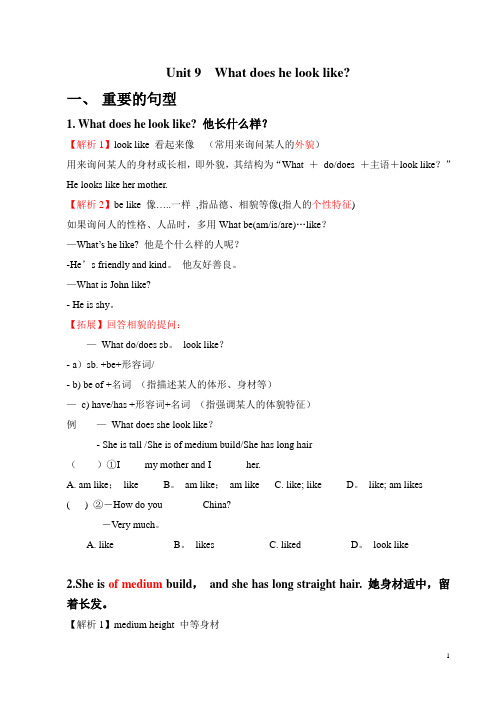
Unit 9 What does he look like?一、重要的句型1. What does he look like? 他长什么样?【解析1】look like 看起来像(常用来询问某人的外貌)用来询问某人的身材或长相,即外貌,其结构为“What +do/does +主语+look like?”He looks like her mother.【解析2】be like 像…..一样,指品德、相貌等像(指人的个性特征)如果询问人的性格、人品时,多用What be(am/is/are)…like?—What’s he like? 他是个什么样的人呢?-He’s friendly and kind。
他友好善良。
—What is John like?- He is shy。
【拓展】回答相貌的提问:—What do/does sb。
look like?- a)sb. +be+形容词/- b) be of +名词(指描述某人的体形、身材等)—c) have/has +形容词+名词(指强调某人的体貌特征)例—What does she look like?- She is tall /She is of medium build/She has long hair()①I ____ my mother and I ______ her.A. am like;like B。
am like;am like C. like; like D。
like; am likes ( ) ②-How do you _______ China?-Very much。
A. like B。
likes C. liked D。
look like2.She is of medium build,and she has long straight hair. 她身材适中,留着长发。
【解析1】medium height 中等身材【解析2】表示某人中等身材或中等个头时,其构成为“sb +be +of +medium build/height"。
人教版英语九年级Unit9单元知识点归纳

人教版英语九年级Unit9单元知识点归纳Unit 9: Describing PeopleIn Unit 9, we have learned various vocabulary and grammar structures related to describing people. This unit is important for building our English language skills and expanding our ability to communicate effectively about appearances and personalities. In this article, we will summarize the key points and takeaways from Unit 9 of the People's Education Edition's 9th-grade English curriculum.1. Physical Appearance- We learned words to describe physical appearance such as tall, short, thin, and overweight.- Adjectives like beautiful, handsome, and attractive were introduced to describe people's appearances.- Vocabulary related to different facial features, hairstyles, and clothing styles were covered.2. Personality Traits- Unit 9 provided us with a wide range of vocabulary to describe personality traits, including adjectives like friendly, outgoing, shy, and confident.- We also learned words to describe someone's behavior, such as kind, helpful, and supportive.- Understanding and using these vocabulary words will enable us to accurately describe others' personalities in conversations and discussions.3. Comparing and Contrasting- In Unit 9, we learned comparative and superlative forms of adjectives to compare people's appearances and personalities.- By using structures like "as...as," "more...than," and "the most/the least," we can express similarities and differences between individuals.4. Asking and Answering Questions- The unit taught us useful questions and responses to inquire about someone's appearance and personality.- Question forms like "What does he/she look like?" and "What ishe/she like?" were introduced.- We also practiced forming complete responses to accurately describe people based on the information given.5. Writing Descriptions- Throughout Unit 9, we practiced writing descriptive paragraphs about people.- The paragraphs included details about appearance, personality, and any other relevant information.- We learned to organize our thoughts and use appropriate vocabulary and grammar structures to effectively convey our descriptions.6. Role Plays and Activities- Unit 9 included various role-plays and activities to engage us in practicing the new vocabulary and structures.- These activities aimed to provide real-life situations where we could apply what we learned.- By participating in these activities, we gained confidence in describing people in English.In conclusion, Unit 9 of the 9th-grade People's Education Edition English curriculum focused on teaching us how to describe people effectively. We learned new vocabulary related to physical appearance and personality traits and practiced using them in conversations and written descriptions. By studying this unit, we have enhanced our ability to describe others accurately and expanded our overall language skills.。
八年级上册英语unit9笔记
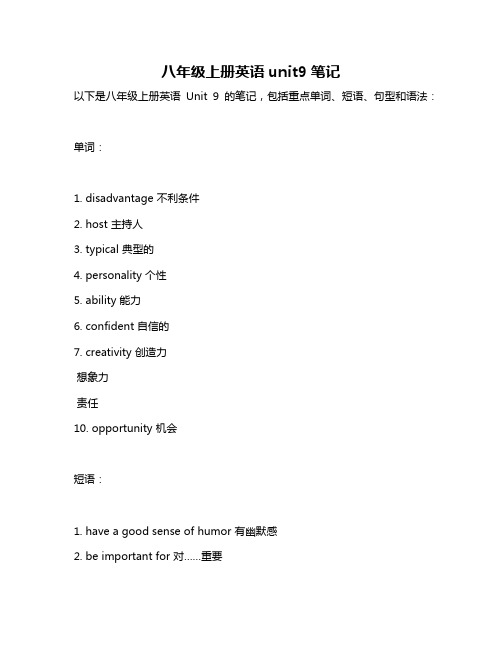
八年级上册英语unit9笔记以下是八年级上册英语Unit 9的笔记,包括重点单词、短语、句型和语法:单词:1. disadvantage 不利条件2. host 主持人3. typical 典型的4. personality 个性5. ability 能力6. confident 自信的7. creativity 创造力想象力责任10. opportunity 机会短语:1. have a good sense of humor 有幽默感2. be important for 对……重要3. be outgoing 外向的4. be friendly 友好5. be hard-working 勤奋的6. be creative 有创造力7. be creative in 在……方面有创造力8. perform well 表现得好9. take charge 负责10. care about 关心句型:1. What are the characteristics of a good friend? 一个好朋友应该具备哪些特点?2. He is always there when I need him. 我需要他的时候他总是在那里。
3. She is the most reliable person I know. 她是我认识的最可靠的人。
4. He has a good sense of humor and always makes me laugh. 他很有幽默感,总是能逗我笑。
5. She is very creative and often comes up with new ideas. 她很有创造力,经常能想出新点子。
6. He is always there to support me and give me encouragement. 他总是在那里支持我,给我鼓励。
7. She is always there to help me and make things easier for me. 她总是在那里帮助我,让事情变得更简单。
七年级英语下册《Unit 9 》知识点汇总(人教版)
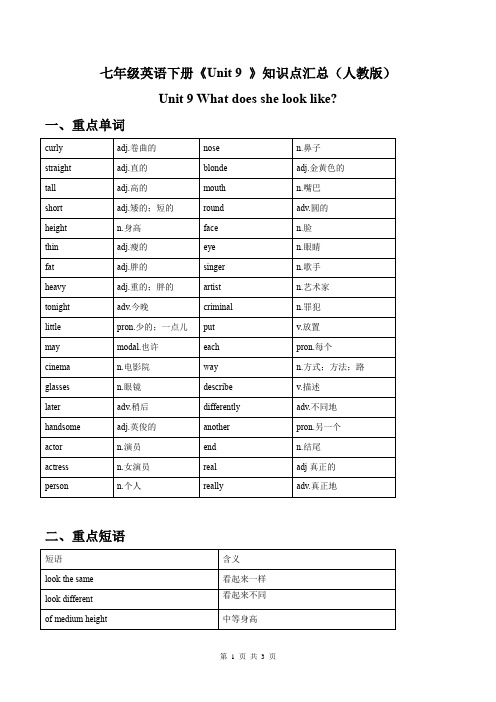
each other
互相;彼此
each of...
每个...
the way to do
做某事的方法
on the way to s.p
在去某地的路上
in the end
最后
straight hair
直发
put on
穿上
a round face
一张圆脸
三、知识点
1.each的用法
①代词,表示两者中的每一
height
n.身高
face
n.脸
thin
adj.瘦的
eye
n.眼睛
fat
adj.胖的
singer
n.歌手
heavy
adj.重的;胖的
artist
n.艺术家
tonight
adv.今晚
criminal
n.罪犯
little
pron.少的;一点儿
put
v.放置
may
modal.也许
each
pron.每个
cinema
What issblike?问性格
答
体型:heavy(fat), thin, be of medium build
身高:tall. short, be of medium height
五官:big/small eyes, big/straight/ hooked nose, small/wide mouth, round/long/oval face
n.电影院
way
n.方式;方法;路
glasses
n.眼镜
describe
v.描述
later
adv.稍后
人教版八年级英语下册Unit9知识点归纳

人教版八年级英语下册Unit9知识点归纳Unit 9: Have you ever been to a museum。
Knowledge Points Summary1.Key Phrases:At night: during the nightIn a more natural environment: in a setting that is more naturalAll year round: XXXXXX: XXXIn the dark: in a place without lightIn the past: in us timesHave been to: visited a placeScience museum: a museum focused on scienceHistory museum: a museum focused on historyXXX park: XXXGo XXX: visit a place that is not familiarGo skating: ice skateTake the subway: XXX systemA great way to XXXAll the old movie cameras: all the antique movie cameras Learn about something: gain knowledge about a topic On the weekend: during the weekendXXX: sleep in a tent in the mountainsPut up a tent: assemble a XXXIn such a rapid way: in a very fast mannerDifferent kinds of: us types ofDevelopment of toilets: the progress of XXXSocial groups: XXXXXX XXX: XXXMake a perfect cup of tea with beautiful tea sets: XXXA nice place to XXXXXX of: many。
人教版九年级英语全册Unit9知识点
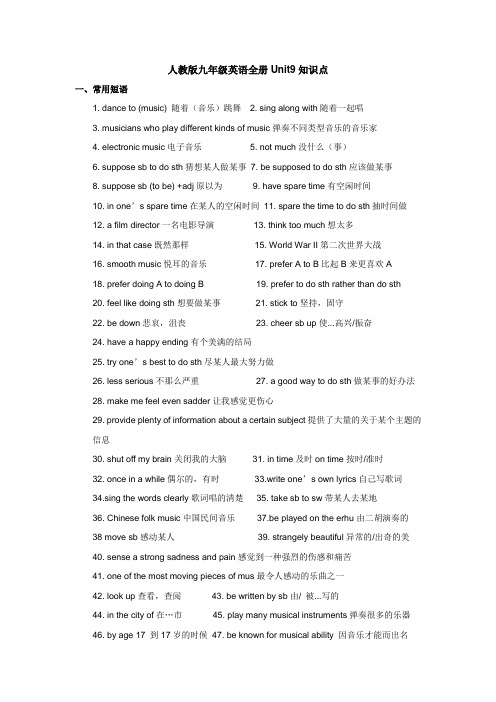
人教版九年级英语全册Unit9知识点一、常用短语1. dance to (music) 随着(音乐)跳舞2. sing along with随着一起唱3. musicians who play different kinds of music弹奏不同类型音乐的音乐家4. electronic music电子音乐5. not much没什么(事)6. suppose sb to do sth猜想某人做某事7. be supposed to do sth应该做某事8. suppose sb (to be) +adj原以为9. have spare time有空闲时间10. in one’s spare time在某人的空闲时间11. spare the time to do sth抽时间做12. a film director一名电影导演13. think too much想太多14. in that case既然那样15. World War II第二次世界大战16. smooth music悦耳的音乐17. prefer A to B比起B来更喜欢A18. prefer doing A to doing B 19. prefer to do sth rather than do sth20. feel like doing sth想要做某事21. stick to坚持,固守22. be down悲哀,沮丧23. cheer sb up使...高兴/振奋24. have a happy ending有个美满的结局25. try one’s best to do sth尽某人最大努力做26. less serious不那么严重27. a good way to do sth做某事的好办法28. make me feel even sadder让我感觉更伤心29. provide plenty of information about a certain subject提供了大量的关于某个主题的信息30. shut off my brain关闭我的大脑31. in time及时on time按时/准时32. once in a while偶尔的,有时33.write one’s own lyrics自己写歌词34.sing the words clearly歌词唱的清楚35. take sb to sw带某人去某地36. Chinese folk music中国民间音乐37.be played on the erhu由二胡演奏的38 move sb感动某人39. strangely beautiful异常的/出奇的美40. sense a strong sadness and pain感觉到一种强烈的伤感和痛苦41. one of the most moving pieces of mus最令人感动的乐曲之一42. look up查看,查阅43. be written by sb由/ 被...写的44. in the city of在…市45. play many musical instruments弹奏很多的乐器46. by age 17 到17岁的时候47. be known for musical ability 因音乐才能而出名48. develop a serious illness得了一种很重的病49. become blind成了盲人,变瞎50. for several years几年51. make money赚钱52. get married (to sb) (和某人)结婚53. continue to do sth继续做某事54.perform in this way用这种形式表演55. during/ in one’s lifetime在某人有生之年56. by the end of到...末为止57. It’s a pity that遗憾的是58. in total总共59. be recorded for the future world to hear被记录下来供后人聆听60. the great erhu masters很棒的二胡大师61. master a foreign language掌握一门外语62. praise...for因为什么赞美63. China’s national treasures中国的国家珍宝64. paint a picture of描绘了一幅画65. recall one’s deepest wounds唤起某人最深的伤痛66. painful experiences痛苦的经历67. a time for spreading joy传播快乐的时间二、重点语法1.prefer的用法【1】prefer A to B、A与B相比较,比较喜欢A例:I prefer English to Chinese. I prefer fish to meat.【2】prefer doing A to doing B,A与B相比,比较喜欢做A 例:I prefer swimming to running.【3】prefer to do A rather than do B,A与B相比,比较喜欢做A 例:I preferred to stay behind rather than go with you.【4】词组prefer not to do “不愿意做...”2. whatever相当于no matter what例:Wherever you go, whatever you do, I’ll be right here waiting for you.3. cheer up高兴起来;振作起来使欢乐;使高兴例:Cheer up!Your troubles will soon be over.He tried to cheer them up with funny stories.2.marry娶;嫁;结婚;和...结婚marry sb. / get married 表示动作例. He married a pretty girl.She married a soldier. =She got married to a soldier.They got married last year.4. keep healthy 保持健康例. In order to keep healthy, he keeps jogging every day.keep in good health, keep fit和stay healthy 都表示“保持健康”巧记以o结尾的名词变复数:注:,hero英雄,tomato西红柿,potato土豆,这些词变复数时要加是-es,其余以o结尾的加-s。
人教版九年级英语unit9知识点内容

人教版九年级英语unit9知识点内容英语应当是长期坚持的结果,每天要保证有最少半个小时的学习时间,不管是读还是写。
要长期坚持。
这次我给大家整理了人教版九年级英语unit9学问点内容,供大家阅读参考。
人教版九年级英语unit9学问点内容一.Unit9 学问梳理【重点短语】1. dance to (music) 随着(音乐)跳舞2. sing along with 随着…一起唱3. musicians who play different kinds of music弹奏不同类型音乐的音乐家4. electronic music 电子音乐5. not much 没什么(事)6. suppose sb to do sth. 猜测某人做某事7. be supposed to do sth 应当做某事8. suppose sb (to be) +adj. 原以为…9. have spare time 有空闲时间10. in one’s spare time在某人的空闲时间11. spare the time to do sth 抽时间做…12. a film director 一名电影导演13. think too much 想太多14. in that case 既然那样15. World War II 其次次世界大战16. smooth music 悦耳的音乐17. prefer A to B 比起B来更喜爱A18. prefer doing A to doing B19. prefer to do sth. rather than do sth.20. feel like doing sth 想要做某事21. stick to 坚持,固守22. be down 悲惨,懊丧23. cheer sb up 使… 开心/ 激昂24. have a happy ending 有个美满的结局25. try one’s best to do sth. 尽某人最大努力做…26. less serious 不那么紧要27. a good way to do sth 做某事的好方法28. make me feel even sadder 让我感觉更难过29. provide plenty of information about a certain subject供应了大量的关于某个主题的信息30. shut off my brain 关闭我的大脑【重点句型】1. I love singers who write their own music.我喜爱自己创作曲子的歌手。
七年级上unit9知识点

七年级上unit9知识点
七年级上unit9是初中英语中的重要阶段,本单元主要涵盖了日常生活中的各种常见场景,包括问路、购物、旅游等。
在这一单元中,学生们将学会如何有效地进行口语交流,为将来的生活和学习打下坚实的基础。
以下是本单元的主要知识点:
一、问路:
在日常生活中,问路是非常常见的,学会如何问路可以帮助我们更好地适应新的环境。
在本单元中,我们将学会以下几个关键点:
1. 如何用英语表达位置和方向
2. 如何问路和指路
3. 如何表达距离和时间
二、购物:
在购物时,我们需要掌握一些必要的英语单词和短语。
以下是本单元中的一些重点:
1. 如何表达商品的价格和颜色
2. 如何购买日常用品
3. 如何向店员询问一些信息
三、旅游:
在旅游中,我们需要掌握一些基础的英语口语技能。
以下是本单元中我们需要了解的一些重点内容:
1. 如何预定旅馆和机票
2. 如何询问和理解当地文化
3. 如何在旅途中保证安全
四、其他:
在本单元中,我们还将学习一些其他重要的英语知识点,包括:
1. 如何使用不同的时态
2. 如何正确使用形容词和副词
3. 如何理解文化差异和背景知识
以上是本单元的主要知识点,通过学习这些内容,我们将掌握
一些基础的英语口语技能,对于日常生活和学习都有很大的帮助。
在学习过程中,我们还需要不断地进行练习和巩固,使得自己的
英语水平能够得到有效的提升。
希望大家能够认真学习,不断进步。
- 1、下载文档前请自行甄别文档内容的完整性,平台不提供额外的编辑、内容补充、找答案等附加服务。
- 2、"仅部分预览"的文档,不可在线预览部分如存在完整性等问题,可反馈申请退款(可完整预览的文档不适用该条件!)。
- 3、如文档侵犯您的权益,请联系客服反馈,我们会尽快为您处理(人工客服工作时间:9:00-18:30)。
1.用于(做)……
2.错误地……
3.终于,最后……
4.偶然地,意外地……
5.根据,按照,据…所说
6.陷入,落入……
7.这样……
8.比起…更喜欢
9.超过……10.与….相撞11.跌倒
12.把…分成…. 13.梦见,梦想
It’s used for scooping really cold ice cream.
be used for…意为“用于(做)……”强调用途或作用,for 为介词,后接名词或动词的ing形式。
如:English is widely used for business between different countries.
含use的其他短语:
Be used by意为“被……使用”,介词by后接动作的执行者。
如:This kind of book is used only by doctors.
Be used as意为“被用作……”介词as表示“作为”,后接名词。
如:The room was used as a meeting room last year.
Be used to do…意为“被用来做…”,to为动词不定式符号。
如:Wood can be used to make paper.
Used to do…意为“过去常常……”,to为动词不定式符号,后接动词原形。
如:There used to be a small river near our village.
Be used to doing sth 意为:“习惯做某事”,to为介词,后接名词、代词或动词的ing形式,系动词be可换为get或become.如:I believe you’ll soon get used to our eating habits.
Potato chips were invented by mistake.
Did you know that tea,the most popular drink in the world(after water),was invented by accident?
By mistake 意为“错误地”;by accident 意为“偶然地,意外地”,相当于by chance.如:
I’m sorry I’ve taken your dictionary by mistake.
The little girl knocked the glass off by accident.
George Crum cooked them for a long time until they were crispy. Although tea wasn’t brought to the Western world until 1610,this beberage was discovered over three thousand years before that.
Until 用于肯定句时,主句中的谓语动词常是延续性动词。
如:continue in this direction until you see a sign.
Not…until…意为“直到……才……”,主句中的谓语动词常是非延续性动词。
如:They didn’t leave until they finished the cleaning. According to an ancient Chinese legend,the emperor ShenNong discovered tea when he was boiling drinking water over an open fire. According to 为短语介词,意为“根据,按照,据……所说,视……而定”后接名词、代词等。
According to sb表示“根据某人的意见”,相当于in one’s opinion.如:
According to the traffic rules ,you must stop at red lights.
According to Mr Li,we should try to guess the meaning of an unknown word in a passage.
The aim of basketball is for players to get a ball into the basket:a net hanging from a metal hoop.
Basketball has also become a more popular sport for people to watch. 第一个下划线部分是动词的ing形式短语作后置定语,修饰前面的名词net,相当于定语从句which hangs from a metal hoop.
第二个下划线部分是动词不定式复合短语作后置定语,修饰前面的名词sport,动词不定式前用介词for引出该动词不定式的逻辑主语。
动词的ing形式、动词的ed形式与动词不定式作后置定语时的区别:动词的ing形式短语作定语时,与被修饰词之间在逻辑上是主谓关系。
如:Do you know the number of foreign guests coming to the party?
动词的ed形式短语作定语时,与被修饰词之间在逻辑上是动宾关系。
如:The meeting held yesterday afternoon was a great success.
动词不定式短语用作定语时,通常在句中有该动词的逻辑主语,且该动词与被修饰词之间在逻辑上是动宾关系,此外,如果这个动词是不及物动词,要加适当的介词。
如:Finally, he found a house to live in. Players move towards one end of the court while throwing the ball to each other.
当主句和while/when 引导的时间状语从句的主语一致,且从句中的谓语由“be+动词ing形式”构成,从句中得主语和be动词常可省略。
如:I met my head teacher while shopping in the supermarket this morning.
It is believed that on December 21st,1891,the first basketball game in history was played.
It is believed that……意为“人们认为/相信”it是形式主语,真正的主语为that引导的从句。
类似的句型有It is said that(据说)……It is reported …(据报道)……,It is supposed that…(据猜测)……等。
如:
It is said that those who eat the most are the least healthy.
It is reported that twenty men were killed in the clash.
It is supposed that she is a professor.
…and the number of foreign players in America’s NBA has increased. The number of …意为….的数量,后接可数名词复数,谓语动词用单数形式。
如:The number of children in the performance is around 100.
A number of 意为“几个,若干”,相当于several,后面接名词复数作主语时,谓语动词用复数形式。
A large number of “大量的”
被动语态由“助动词be+及物动词的ed形式”构成。
助动词be有人称、数和时态的变化。
不同时态的被动语态结构如下。
Am/is/are+及物动词的ed形式。
(一般现在时:)
Was/were+ 及物动词的ed形式。
(一般过去时)
Will/shall+be+及物动词的ed形式(一般将来时)
Have/has been +及物动词的ed形式
含情态动词的被动语态:情态动词(can/must/should/may等)+be +及物动词的ed形式。
当主句中得谓语动词是“一感觉feel;二听(hear、listen to)、两使
(make\have)”、四看(see \watch\look at\notice)时,其后作宾语补足语的动词不定式要省略to,但变为被动句时,要补上动词不定式符号to.
The big boy made the little one cry this morning.
The little boy was made to cry by the big one this morning.
含短语动词的被动语态,其短语中的介词或副词不能丢掉。
如:The children are well looked after by the babysitter.。
